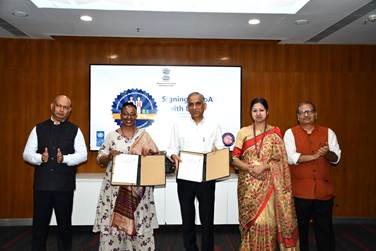On the occasion of Labour Day 2025, the Ministry of Social Justice and Empowerment (MoSJE) has taken a landmark step by signing a Letter of Agreement (LoA) with UNDP, for recognizing and strengthening the wastepickers contribution in waste collection, recovery and recycling. The initiative would be providing them improved access to finance and relevant technologies along with safe and sustainable work environment.

The LoA was exchanged between Dr. Angela Lusigi, Resident Representative for the United Nations Development Programme (UNDP) in India and Amit Yadav, Secretary, Department of Social Justice and Empowerment (DoSJE). Yogita Swaroop, Economic Advisor, DoSJE, and P.K. Singh, Managing Director, National Safai Karamcharis Finance and Development Corporation (NSKFDC), were also present at the LoA signing ceremony.
The UNDP has stepped forward to provide crucial financial support for the establishment of State Project Management Units (PMUs) across various States under the NAMASTE Scheme. This strategic intervention by UNDP will significantly streamline coordination between Central authorities and State governments, ensuring more effective and timely implementation of the scheme’s objectives thereby improving outcomes for all stakeholders involved in the scheme.
Wastepickers have been added as a component under the National Action for Mechanised Sanitation Ecosystem (NAMASTE) Scheme from the financial year 2024. NAMASTE is being implemented by MoSJE for broadening the formal inclusion of waste pickers across India, with an aim to enumerate 2,50,000 waste pickers nationwide.
The NAMASTE Scheme’s wastepicker component aims to enumerate and recognize them through a nationwide digital profiling and registration drive. The focus is to provide occupational photo ID cards to ensure formal identity and access to government benefits.
It aims to offer health insurance coverage under Ayushman Bharat-PMJAY, skill upgradation training, provision of PPE kits, and capital subsidies for waste collection vehicles. It will also facilitate the formation and strengthening of wastepicker collectives, enabling them to manage Decentralized Waste Collection Centers (DWCCs) and improve their livelihoods.
Since the scheme’s rollout, over 5,000 wastepickers have been profiled across multiple States, marking a significant milestone in the formal recognition and integration of this workforce. The profiling is being carried out using a dedicated NAMASTE mobile application, ensuring a robust and accessible database for extending scheme benefits.

